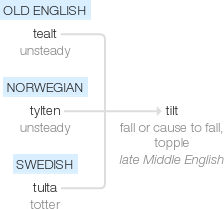Tilt
late Middle English (in the sense ‘fall or cause to fall, topple’): perhaps related to Old English tealt ‘unsteady’, or perhaps of Scandinavian origin and related to Norwegian tylten ‘unsteady’ and Swedish tulta ‘totter’.
wiktionary
From Middle English tilte, from Old English tyltan(“to be unsteady”). Cognate with Icelandic tölt(“an ambling place”). The nominal sense of "a joust" appears around 1510, presumably derived from the barrier which separated the combatants, which suggests connection with tilt "covering". The modern transitive meaning is from 1590; the intransitive use appears 1620.
From Middle English telte, tield, teld, from Old English teld(“tent”), from Proto-West Germanic *teld, from Proto-Germanic *teldą(“tent”). Perhaps influenced by Middle Low German telt, [1] or Danish telt. [2] Cognates include German Zelt(“tent”), Old Norse tjald(“tent”) (whence also archaic Danish tjæld(“tent”)). More at teld.
etymonline
tilt (v.1)
Old English *tyltan "to be unsteady," from tealt "unsteady," from Proto-Germanic *taltaz (source also of Old Norse tyllast "to trip," Swedish tulta "to waddle," Norwegian tylta "to walk on tip-toe," Middle Dutch touteren "to swing"). Meaning "to cause to lean, tip, slope" (1590s) is from sense of "push or fall over." Intransitive sense "to lean, tip" first recorded 1620s. Related: Tilted; tilting.
tilt (n.1)
"a joust, a combat," 1510s, perhaps from tilt (v.1) on the notion of "to lean" into an attack, but the word originally seems to have been the name of the barrier which separated the combatants, which suggests connection with tilt in an earlier meaning "covering of coarse cloth, an awning" (mid-15c.). This is perhaps from tilt (v.1), or related to or influenced by tent. Watkins derives it from Old English teld "awning, tent," related to beteldan "to cover," from Proto-Germanic *teldam "thing spread out." Hence, also full tilt (c. 1600). Pinball machine sense is from 1934.
tilt (n.2)
"condition of being tilted," 1837, from tilt (v.1).
tilt (v.2)
"to joust," 1590s, from tilt (n.1). Related: Tilted; tilting. The figurative sense of tilting at windmills is suggested in English by 1798; the image is from Don Quixote, who mistook them for giants.
So saying, and heartily recommending himself to his lady Dulcinea, whom he implored to succour him in this emergency, bracing on his target, and setting his lance in the rest, he put his Rozinante to full speed, and assaulting the nearest windmill, thrust it into one of the sails, which was drove about by the wind with so much fury, that the lance was shivered to pieces, and both knight and steed whirled aloft, and overthrown in very bad plight upon the plain. [Smollett translation, 1755]
